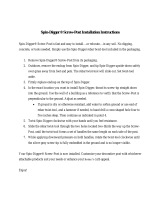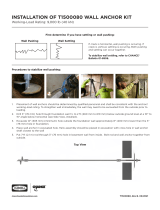Page is loading ...

PISA® ANCHORS
Application/Installation
hubbellpowersystems.com
STANDARD STRENGTH STANDARD STRENGTH
ANCHORSANCHORS
MID-STRENGTH ANCHORSMID-STRENGTH ANCHORS
ANCHOR
APPLICATIONS
For distribution guy loads, 3
1
⁄
2
and 7
foot anchor rods are used.
For distribution and sub-
transmission guy loads, 3
1
⁄
2
and 7 foot
anchor rods are used.
INSTALL IN THESE
CLASS SOILS
Classes 5 and 6 (200-400 inch-
pounds with the soil test probe)
Classes 4, 5 and 6 (200-500 inch-
pounds with the soil test probe)
INSTALLING
EQUIPMENT
REQUIRED
Power digger and wrench assembly Power digger and wrench assembly
LIMITATIONS
ON USE
Do not use in hard soils beyond
two extensions (14-feet). Maximum
installation torque is 4,000 foot-
pound.
Do not use in very hard soils or
beyond two extensions (14-feet).
Maximum installation torque is
6,000 foot-pound.
PISAPISA
®®
-6 ANCHORS -6 ANCHORS
(FORMERLY PISA(FORMERLY PISA
®®
-5 -5
ANCHORS)ANCHORS)
PISAPISA
®®
-7 ANCHORS-7 ANCHORS
ANCHOR
APPLICATIONS
For distribution and sub-
transmission guy loads, 3
1
⁄
2
and 7
foot anchor rods are used.
For distribution and transmission
guy loads, 3
1
⁄
2
and 7 foot anchor rods
are used.
INSTALL IN THESE
CLASS SOILS
Classes 4, 5 and 6 (200-500 inch-
pounds with the soil test probe)
Classes 2, 3, 4 and 5 (300-750 inch-
pounds with the soil test probe)
INSTALLING
EQUIPMENT
REQUIRED
Power digger and wrench assembly Power digger and wrench assembly
LIMITATIONS
ON USE
Do not use in very hard soils or
beyond two extensions (14-feet).
Maximum installation torque is
6,000 foot-pound.
Do not use in hard, rocky soils or
beyond two extensions (14-feet).
Maximum installation torque is 7,000
foot-pound.

hubbellpowersystems.com
HOW TO USE POWER-INSTALLED SCREW ANCHORS
ANCHOR WRENCH
Kelly bar adapter is attached to digger’s Kelly bar by a bent arm pin (supplied with Kelly
Bar Adapter). Locking dog assembly holds the drive end assembly. If anchor depth of
one 7’ rod length is desired, drive end assembly is all that’s required. If anchor is to be
installed deeper than one anchor rod length, the 3-1/2’ extension assembly is attached
between drive end assembly and locking dog assembly to obtain added depth. PISA®
anchors should not be installed beyond 14’ since wrench retrieval is difficult beyond this
depth.
STEP ONE - OPEN LOCKING DOGS
Before installing drive end assembly in locking dog assembly, open dogs
by pulling outward and twisting to outside position. NOTE: Locking dog
assembly has three ring positions. Middle position holds wrench drive
end assembly. Inside ring position allows locking dogs to hold anchor
rod. Outside position releases drive end assembly from locking dog
assembly.
STEP TWO - INSERT DRIVE END ASSEMBLY
With locking dog rings in outside position, insert drive end assembly
into locking dog assembly. Rotate rings to middle position. Drive end
assembly will be captured in locking dog assembly. Now rotate locking
dogs to inside position to accept and capture anchor rod.
General Installation Considerations
Four words summarize proper anchor installation technique: “proper alignment” and “down pressure.” The PISA®
anchor wrench transmits torque from the digger’s Kelly bar to the anchor hub. (The anchor rod only has to be of
sufficient diameter to support the guy load.) Always maintain adequate down pressure and keep the Kelly bar and
the wrench aligned with the anchor. The right amount of down pressure keeps the anchor continuously advancing.
Too much down pressure may bend or even break an anchor helix at torque loads far below the rating. Too little
down pressure may result in “churning” the soil, damaging the wrench and possibly damaging the digger truck.
Either extreme may result in wasted time, reduced holding capacity and damaged equipment.
FOR SITUATIONS WHERE OVERHEAD LINES ARE NOT AN OBSTRUCTION
STEP-BY-STEP ANCHOR INSTALLATION PROCEDURE
STEP THREE - INSERT ANCHOR ROD IN DRIVE END ASSEMBLY
Because locking dogs are now at inside position, assembly will hold
anchor rod. Screw rod into the threads located in the hub of the anchor
helix. Insert rod into drive end assembly with an upward thrust.

HOW TO USE POWER-INSTALLED SCREW ANCHORS
STEP FOUR - LOCKING ANCHOR IN PLACE
With strong upward motion, lock anchor into wrench. Locking dogs,
properly closed to inside position, will hold anchor rod in wrench.
STEP FIVE - INSTALL ANCHOR
Begin anchor in near vertical position. When anchor has a good start,
retract boom to correct anchor angle. Complete installation. During
installation, truck outriggers should lift slightly. Avoid excessive uplift
When locking dogs reach ground level, stop installation.
STEP SIX - RETRIEVE WRENCH
Position locking dog rings in middle position and withdraw wrench.
Anchor rod will remain in ground.
STEP SEVEN - ATTACH ANCHOR EYE NUT
FOR AN INSTALLATION DEEPER THAN ONE ANCHOR
ROD LENGTH, PERFORM FOLLOWING STEPS
REMOVE LOCKING DOG ASSEMBLY AT GROUND LEVEL
Position locking dog rings in outside position and withdraw locking dog assembly.
ADD ANCHOR ROD EXTENSION
Add anchor extension rod to rod remaining in ground.
ATTACH WRENCH ASSEMBLY
With wrench extension bolted to drive end assembly in the ground and
locked in position at the locking dogs, installation can proceed.
COMPLETE THE INSTALLATION
When locking dogs reach ground level, position locking dogs in middle
position and retrieve the drive end assembly and extension assembly.
Attach anchor eye nut and the
installation is complete
NOTE: Always refer to the actual supplied tooling
instructions before any installation as conditions may
require a modification in practiced methods.
©2019 Hubbell Incorporated.
Because Hubbell has a policy of continuous product improvement,
we reserve the right to change design and specifications without notice.
Printed in the U.S.A. | TD_06_131_E
For product inquiries, please contact your local sales
representative or customer service representative.
hubbellpowersystems.com
/



